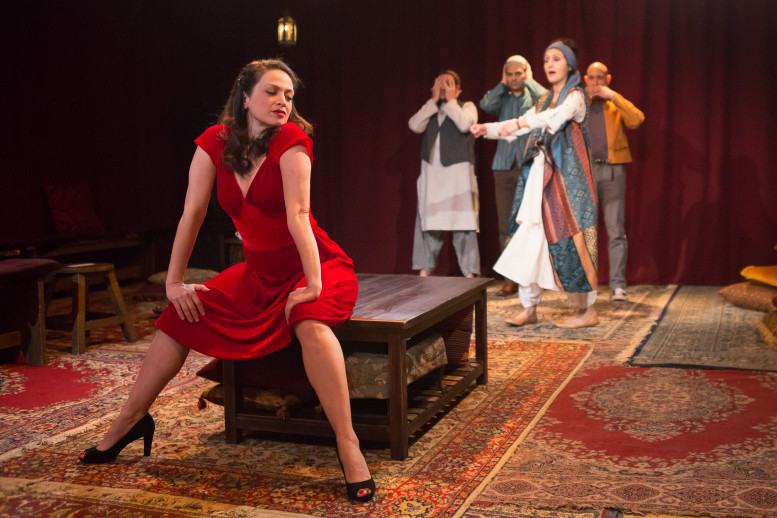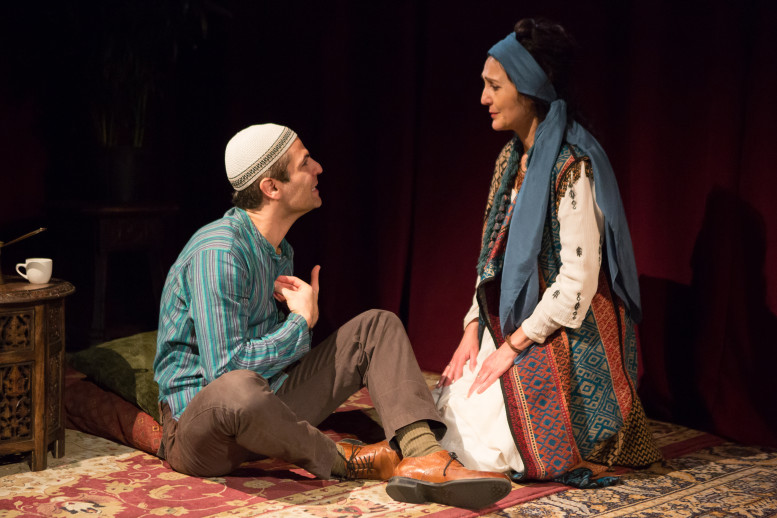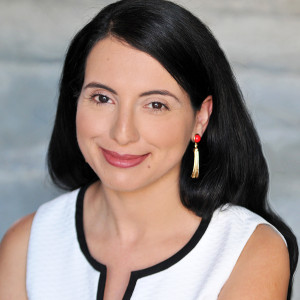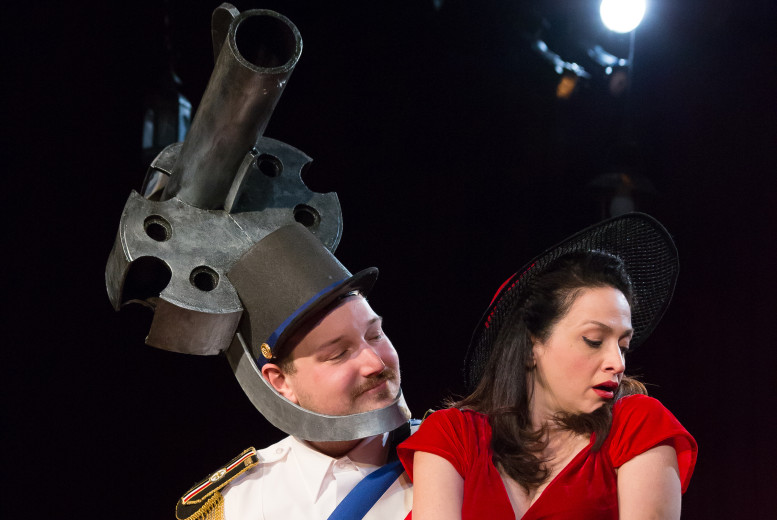A recurring question when we discuss immersive and interactive performance on Extended Play is, “Is this the future of theater?” Playwright Betty Shamieh thinks so. Extended Play’s James Carter spoke with Betty about her new, immersive play “The Strangest,” which is inspired by Camus’ “The Stranger.” She discusses the research trip she took to Aleppo, Syria, her collaboration with May Adrales and the actors, and the reason it was so important for her to break the fourth wall and bring the audience in on the action.
This interview has been lightly edited for length and clarity.
JAMES CARTER: How is the show going?
BETTY SHAMIEH: I am incredibly delighted with the production. They did an amazing job. I think the actors were wonderfully well cast. You know, it’s not realism, and I think it’s going to be exciting and interested to see how American audiences, who are use to realism, react to this kind of very absurdist, experimental show. But I couldn’t be happier with May’s work or the actors’ work. I really think they did a tremendous job with this production. And that’s hard. I write a lot of ensemble projects, and usually, there’s one or two people who don’t fit with the cast. I tend to also like to give people their first opportunities, particularly actors of color. This cast is really tremendous and have taken the bull by the horns and have been so supportive of May and me. It was a heavily designed show because part of it was site-specific, so that was exciting to work that closely with designers. The project was really fun.
JAMES: You’ve been working on it for quite a while.
BETTY: Yes, I have. I’ve been developing for five years with May, and the politics of the region changed. I went to Syria in 2011 to research this oral storytelling tradition where masters of myths and legends would come into coffee houses and tell stories. So it was art in unexpected places in the Middle East. So I went to Syria to research that because, oddly enough, the time period seemed unlike Algeria, a place that was going to be untouched by Arab Spring, but while I was there, the first demonstrations started to erupt when I was in Aleppo. So it’s hilarious that I thought that was the one place that I could go and safely do my little research on this ancient storytelling tradition, and it turned out not to be the case at all. I am glad I got to see Aleppo before it got destroyed. It was really a magical, in terms of history, you know there’s so many people who controlled Syria for longer periods of time than you would even imagine. You had the Greeks, you had whole different traditions all layered with the Islamic tradition and the more recent tradition. There’s a lot of Christian. You know, that’s where St. Paul had his big revelation. The road to Damascus. All these different religion time periods beautifully preserved while I was there, and I don’t know how it is now.

So I went there to study this ancient tradition, and what I ended up being able to witness was revolution, and that’s what the play is about. It’s about Algerians overthrowing this French colonial system that had been in place for over 100 years that was unlike most colonials systems. The French were integrated into Algerian society for multiple generations, so by the time someone like Camus’ family lived there, it was very entrenched. The idea of moving French occupiers out of Algeria was not something that people could conceive of, so there were these two movements to make the Algerians actually have rights. Because they didn’t have voting rights. They weren’t allowed to move around freely. There were two movements. One was to integrate into Algerian society for equality, and the other was to overthrow French occupation. And this play is set in the period of the 1940’s when many of the Algerians, like the characters, are very, Algeria was also a place where Camus was from there and Sartre was interested in it. It was intellectually a very rife community, so you had these Arab artists who were kind of part of that movement but always separate. Genet is a character—he’s an unspoken about character in the play. He doesn’t appear in the show, but I thought it would be fun to stick Genet in this play that brings to life Camus’ character. It’s not a literal thing, but he did spend a lot of time in Lebanon. He did will his estate to a Moroccan that he happened to meet at the end of his life. He was very much that kind of person. What was very exciting about this was we were able to recreate a Middle Eastern coffee house, and that experience of the oral tradition could—you know, the live performance tradition of telling stories like the “Arabian Nights” predates Shakespeare. It doesn’t seem as theatrical, generally, when you think about theater, but when you see things like solo performance or even stand up comedy you realize there’s a direct link from that kind of hovering around the campfire to our own live performance.
French Algeria was unlike most colonial places. A place where there was definitely Arab elements and definitely European elements within the same culture. So when I wanted to tell a story about French Algiers, I decided to create theatrically in the storytelling mode, that storytelling part—here’s a portion of it that is presented as a storyteller—and then the multi-character scenes that we’re use to as Western audiences, where there’s a fourth wall and the actors pretend that they don’t see you and they do scenes with lights shining on them.
If you think about it, it’s a very weird impulse. What evolutionary function is it to pretend that things that are not happening are real and to go on that journey with these characters? It’s a very strange thing that we do as theater artists. It’s not like food or shelter. It’s something that’s much more mysterious. We don’t know why we evolved to make these live performance storytelling traditions. So I wanted to, in this story that was about Europeans and Arabs living together and not living together nicely, I wanted to use the theatrical traditions to on one level warn people that there was a theatrical life in this tradition that did pre-date Shakespeare and mix it together in that way. Yes, they’re different forms, but they’re both about a live performer telling a story…because it’s so hard to get people to shut up and listen. So why would we go and put ourselves in this situation where we have to shut up and listen for an hour and a half in theater? When it’s so against our nature because we just want to talk all day. There’s something, to me, really interesting and fruitful about that, that way of mixing the two different performance traditions and seeing, “Do they live side by side?” I’m pushing the forms; of course, I know how to write a well-made play.
My first two plays were “Roar” and “Chocolate in Heat,” and one was just a series of monologues. Very simple storytelling. The other was a very well-made play. but, to me, that’s not interesting. Even though I know how to do that, it’s not what I think American audiences are craving. I’ve been delighted with the response from the audiences for this particular project and this play, which is why both May and I, who have worked Off-Broadway in very supported situations, chose to, as a labor of love, to put this story out in the world. The actors, many of them have been on Broadway or have major roles on T.V. shows, they’re also working below their pay scale to bring this story to life because they’re very passionate about this particular project. I couldn’t ask for anything more as an artist to have people who are working at the top of their form in major supported ways, come and do a little show downtown because they really care about the project. It’s about storytelling cafés and masters of storytelling and a woman who comes in and says, “My father was the greatest storyteller in Algeria, and women are not welcome. But I’m going to tell you a story.” So to not be able to have an actress like Jacqueline (Antaramian) or Alok (Tewari), who are our two main storytellers, for them to not be able to carry that would have been disastrous for the project.
My first two plays were “Roar” and “Chocolate Teeth,” and one was just a series of monologues. Very simple storytelling. The other was a very well-made play. but, to me, that’s not interesting. Even though I know how to do that, it’s not what I think American audiences are craving. I’ve been delighted with the response from the audiences for this particular project and this play, which is why both May and I, who have worked Off-Broadway in very supported situations, chose to, as a labor of love, to put this story out in the world. The actors, many of them have been on Broadway or have major roles on T.V. shows, they’re also working below their pay scale to bring this story to life because they’re very passionate about this particular project. I couldn’t ask for anything more as an artist to have people who are working at the top of their form in major supported ways, come and do a little show downtown because they really care about the project. It’s about storytelling cafés and masters of storytelling and a woman who comes in and says, “My father was the greatest storyteller in Algeria, and women are not welcome. But I’m going to tell you a story. So to not be able to have an actress like Jacqueline (Antaramian) or Alok (Tewari)—who are our two main storytellers—for them to not be able to carry that would have been disastrous for the project.

JAMES: When you went to Aleppo—and subsequently everything that’s happened since the destruction of the city—has there been an added responsibility with regards to this kind of storytelling? How has the last five or six years affected the play?
BETTY: The politics. People keep asking me, “How do you feel about doing the play while Trump’s in office?” To me, and probably to a lot of people of Middle Eastern decent living, American citizens, this time feels dangerous and important to do those shows, but I don’t feel like after the first or second Gulf War, after September 11th, was not also a vulnerable time for my ethnic community in America.
JAMES: Sure.
BETTY: The other thing about the story, for me, is that it’s an iconic story. Overthrowing of the French-Algerian was what sort of led to the Vietnam War and the idea of colonialism. These were new concepts to people. So it’s about French Algeria, but it’s also about Native Americans. It’s about anyone who looks like they could never beat the odds and then somehow do.
I feel like part of America that is not as use to feeling under siege feels under siege in a way that many ethnic communities, not just Arabs but people of color have felt for a long time.
I often say the people we consider our masters of American theater, whether they’re Tennessee Williams or Eugene O’Neill…those are what we study as the masters of the last hundred years, but I don’t think American theater wants to stay in that small, family drama place. The people who come to see “The Stranger” are really ready for bigger stories. We have so much good T.V. out there that if you’re not telling something that is uniquely theatrical, there’s no real reason to work in the theater. We can watch eight episodes of your favorite Netflix show, so I think if theater is going to survive, it’s going to have to be more of what it is. Like, I don’t feel like opera houses are trying to get the latest “Voice” singer so that they sell tickets. So maybe we have to accept that we’re a very rarified form. We’re not the center of the culture like we were when Tennessee Williams was writing, and accept it and embrace it and push forward in that realm if we want to survive because theater, for a certain demographic, can only handle a certain kind of storytelling mode. I never wanted to be the kind of theater artist that makes theater for other theater makers. I wanted to have an audience that was wider than people who were just interested in form or theater. But I also think we need to be better and more imaginative in order to make that happen. That’s what we’re trying to do with “The Strangest.”
“The Strangest” plays through April 1, 2017, at 4th Street Theater.
Purchase Tickets Here
 Betty Shamieh is the author of fifteen plays. Shamieh was awarded a 2016 Guggenheim Fellowship in Drama and Performance Art. Her Off-Broadway premieres are “The Black Eyed” (New York Theatre Workshop, Director: Sam Gold), and “Roar” (The New Group, Director Marion McClinton). “Roar” is currently being taught at universities throughout the United States. “Fit for a Queen” had its world premiere at the Classical Theatre of Harlem in 2016. “The Machine” (Director: Marisa Tomei) was produced by Naked Angels at the Duke Theatre. Her European productions in translation include “Again and Against” (Playhouse Theater, Stockholm), “The Black Eyed” (Fournos Theatre, Athens), and “Territories” (a co-production of the Landes Theatre and the 2009 European Union Capital of Culture Festival). A graduate of Harvard College and the Yale School of Drama, she was selected as a Clifton Visiting Artist at Harvard College and a Playwriting Fellow at the Radcliffe Institute for Advanced Studies. Shamieh was named a UNESCO Young Artist for Intercultural Dialogue in 2011. Her works have been translated into seven languages. www.bettyshamieh.com
Betty Shamieh is the author of fifteen plays. Shamieh was awarded a 2016 Guggenheim Fellowship in Drama and Performance Art. Her Off-Broadway premieres are “The Black Eyed” (New York Theatre Workshop, Director: Sam Gold), and “Roar” (The New Group, Director Marion McClinton). “Roar” is currently being taught at universities throughout the United States. “Fit for a Queen” had its world premiere at the Classical Theatre of Harlem in 2016. “The Machine” (Director: Marisa Tomei) was produced by Naked Angels at the Duke Theatre. Her European productions in translation include “Again and Against” (Playhouse Theater, Stockholm), “The Black Eyed” (Fournos Theatre, Athens), and “Territories” (a co-production of the Landes Theatre and the 2009 European Union Capital of Culture Festival). A graduate of Harvard College and the Yale School of Drama, she was selected as a Clifton Visiting Artist at Harvard College and a Playwriting Fellow at the Radcliffe Institute for Advanced Studies. Shamieh was named a UNESCO Young Artist for Intercultural Dialogue in 2011. Her works have been translated into seven languages. www.bettyshamieh.com
Authors
-

James Carter is a writer and experience designer. He was a founding member of terraNOVA Collective and its associate artistic director for eight years. Recent transmedia plays include "FEEDER: A Love Story" (terraNOVA/HERE, NYC) and "NY_Hearts" (One Muse Presents & The Brick Game Play Festival). James also works as a social impact strategy and research consultant for Lina Srivastava, LLC. He has written for the Creators Project, Culturadar.com, ArtsFwd and Theatre Communications Group.
View all posts -

Betty Shamieh is the author of fifteen plays. Shamieh was awarded a 2016 Guggenheim Fellowship in Drama and Performance Art. Her Off-Broadway premieres are "The Black Eyed" (New York Theatre Workshop, Director: Sam Gold), and "Roar" (The New Group, Director Marion McClinton). "Roar" is currently being taught at universities throughout the United States. "Fit for a Queen" had its world premiere at the Classical Theatre of Harlem in 2016. "The Machine" (Director: Marisa Tomei) was produced by Naked Angels at the Duke Theatre. Her European productions in translation include "Again and Against" (Playhouse Theater, Stockholm), "The Black Eyed" (Fournos Theatre, Athens), and "Territories" (a co-production of the Landes Theatre and the 2009 European Union Capital of Culture Festival). A graduate of Harvard College and the Yale School of Drama, she was selected as a Clifton Visiting Artist at Harvard College and a Playwriting Fellow at the Radcliffe Institute for Advanced Studies. Shamieh was named a UNESCO Young Artist for Intercultural Dialogue in 2011. Her works have been translated into seven languages. http://www.bettyshamieh.com
View all posts









